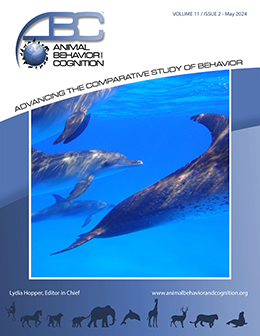Vol 11, Issue 2, May 2024
Refocusing the Debate: Our Original Critiques of Koops et al. (2022) Still Stand
Citation
Tennie, C., & Call, J. (2024). Refocusing the debate: Our original critiques of Koops et al. (2022) still stand. Animal Behavior and Cognition, 11(2), 225-235. https://doi.org/10.26451/abc.11.02.06.2024
Abstract
Koops et al. (2022, 2023) claim that an experimental field study (Koops et al., 2022) provided valid evidence against a latent solution explanation for chimpanzee (Pan troglodytes verus) nut cracking know-how in the wild. In our previous response (Tennie & Call, 2023) we identified two major problems with this interpretation. First, Koops et al. (2022) study subjects were clearly unmotivated to access the intended food reward (nut kernels) – rendering the secondary question of whether they would use tools to crack the provided nuts to access these kernels a moot point. Second, only one of the subjects who came into contact with the experimental setup was within the chimpanzee most sensitive learning bracket to develop nut cracking (identified in previous field studies; Matsuzawa, 1994, 1996; Biro et al., 2003). We concluded that Koops et al.’s (2022) study failed to provide valid evidence against the zone of latent solution hypothesis as applied to chimpanzee nut cracking in the wild. In their reply, Koops et al. (2023) argued against both our critiques. Here, we refocus the debate, reiterate our arguments and provide further evidence that invalidate Koops et al. (2022) conclusion that “nut cracking falls outside” the zone of latent solutions of wild chimpanzees. We end with a call for more data.
Keywords
Nut cracking, Copying, Innovation, Latent Solution, Social learning, Culture, Experimental methods, Chimpanzee, Ape
